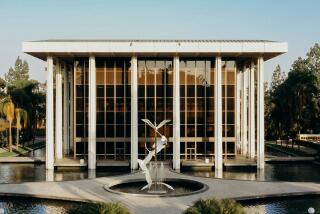There’s more to Nashville than country music
- Share via
NASHVILLE — Years ago, conductors with the Nashville Symphony Orchestra would get hot under the collar when they’d arrive for rehearsal and find their best string players missing, holed up in one of Chet Atkins’ RCA recording sessions on Music Row.
Today, there are enough string players to go around, but that link between the city’s orchestra and its country-music heritage persists, evident in a new $123.5-million symphony hall opening Saturday.
The Schermerhorn Symphony Center is across the street from the Country Music Hall of Fame and Museum and a block south of the honky-tonk district where Willie Nelson and Kris Kristofferson once swapped songs and cold beer.
The elegant, neoclassic hall underscores the intersection of country and classical in this recording capital known as Music City. Curb Records President Mike Curb donated $3 million, and other recording industry executives and artists pitched in lesser amounts. The opening night concert features banjo master Bela Fleck and bassist Edgar Meyer, and the following night gospel and pop singer Amy Grant.
“Music lovers are music lovers,” said Rusty Jones, a Music Row attorney who serves on the symphony’s board of directors. “I think we all recognize that it’s only natural that Nashville should also be one of the world capitals for classical music.”
Trimmed in African makore wood and Spanish and Italian marble, the 1,862-seat center is named in honor of Kenneth Schermerhorn, who led the Nashville Symphony from 1983 until his death in 2005.
Schermerhorn was part of the bridge from the early days of Music Row, when producers like Atkins and Owen Bradley softened country music’s rough edges with string sections, giving rise to the popular “Nashville Sound” of the 1950s and ‘60s.
In those days, the symphony was a part-time job, and the chance to earn a second paycheck in the studios was enticing. Today, many of the orchestra’s 81 musicians still do recording sessions, though their primary income and allegiance lie with the symphony.
More to Read
The biggest entertainment stories
Get our big stories about Hollywood, film, television, music, arts, culture and more right in your inbox as soon as they publish.
You may occasionally receive promotional content from the Los Angeles Times.










